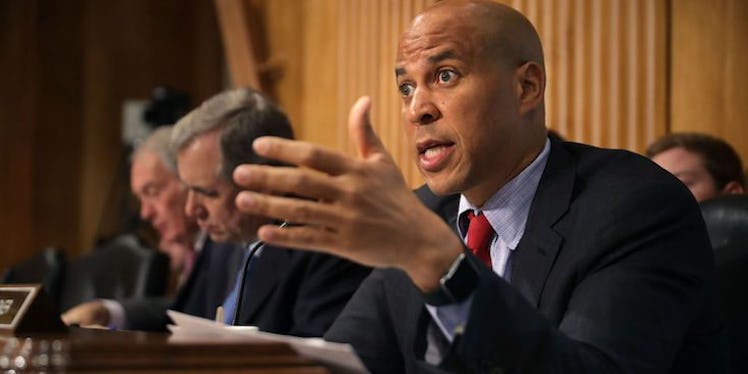
Senator Introduces Bill To Legalize Marijuana At The Federal Level In A Big Move
On Tuesday, Aug. 1, Senator Cory Booker introduced a bold plan to legalize marijuana at the federal level. For Booker, this is a massively important step toward ending the war on drugs. Before outlining what was in the bill, Booker delved into his motivations for pushing for marijuana legalization during a Facebook live video in which he formally announced the bill.
“We are not seeing the equal application of our criminal justice system," Booker said. "We have focused [the War on Drugs] on people in the most vulnerable communities."
Booker noted, for example, that black people are roughly four times more likely than white people to be arrested for marijuana, despite almost identical rates of pot usage. In Booker's view, it's profoundly hypocritical to criminalize young people for life "for doing things more minor, in terms of drug use, than two of our last three presidents admitted to doing."
But, more importantly, Booker explained, legalizing marijuana at the federal level would be a practical and ethical thing for the United States to do given the major potential social and economic benefits. Along these lines, Booker noted states around the country that have legalized marijuana have seen a drop in crime and a rise in revenue.
The New Jersey senator hopes to build on this progress via the elements of his bill.
Booker's marijuana legalization bill has four parts.
First, Booker's bill would remove marijuana from the federal scheduling system, which is why weed is currently illegal at the federal level. While eight states and the District of Columbia have legalized marijuana, it still remains illegal in the eyes of the federal government. Booker's bill would change this. In Booker's view, marijuana legalization in and of itself doesn't go far enough. He also wants to address the damage current federal marijuana laws have done to American communities.
Accordingly, the next aspect of his bill retroactively expunges people who've been convicted for use and possession of marijuana. It would also give an avenue to people currently in prison for marijuana use or possession to petition for their sentences to be reduced or eliminated.
On top of this, the bill would use federal funds to encourage states to legalize marijuana. Technically, even if the federal government legalized pot, states could refuse to do so. This bill seeks to address this by simultaneously pushing for legalization at the federal and state level.
Finally, the bill creates a "community reinvestment fund," which would allow communities disproportionately impacted by draconian marijuana laws to apply for funds that could be allocated toward job training, reentry services, public libraries, community centers, and more.
This bill arguably has an extremely slim chance of making it through Congress.
Booker has no co-sponsors on the bill, but he's hopeful he can generate bipartisan support. But while criminal justice reform has bipartisan support from a broad standpoint, it's unlikely a Congress controlled by Republicans will help a Democratic senator legalize marijuana.
Not to mention, Attorney General Jeff Sessions, who believes marijuana is "only slightly less awful than heroin," is vehemently opposed to such a move and would likely use his influence to push against it.
Still, it does go to show how far this country has come in terms of the movement for marijuana legalization, and this is possibly the most comprehensive piece of legislation ever put forward on this issue.